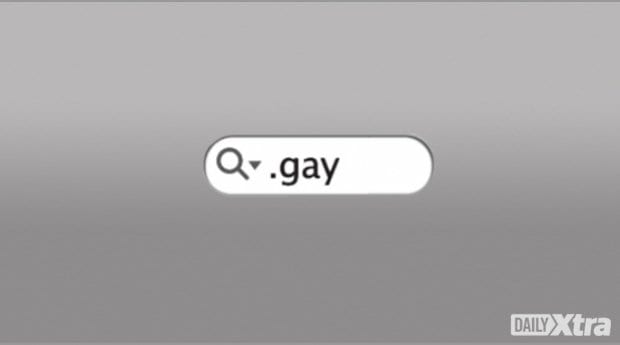An organization committed to promoting LGBT communities on the internet has lost its bid to own the proposed .gay top level domain (TLD).
While there are four competing bids for the .gay domain, only New York–based dotgay LLC applied as a community-based group, which would have given them priority over competitors.
In January 2012, the Internet Corporation for Assigned Names and Numbers (ICANN) launched its New gTLD Program, which opened up domain name endings to almost any word. They are divided into four categories, including standard or generic (.amazon or .google), community (.catholic or .aarp), geographical (.nyc or .berlin) and brand (.unicef or .hitachi).
ICANN, the non-profit organization responsible for domain names such as .com and .org, as well as country codes such as .ca and .cn, received 1,930 proposals from 1,115 applicants looking to operate 1,409 possible TLDs.
ICANN’s Community Priority Evaluation panel awarded dotgay 10 out of a possible 16 points, four points short of the required threshold. Points were given on the basis of a pre-existing organized community, the size and longevity of the community, the connection of .gay to that community, .gay’s meaning outside the community, the applicant’s registration policies and community endorsements.
The panel determined that the term gay identifies only a small subset of the LGBT community as defined in dotgay’s application.
“Included in the application’s community definition are transgender and intersex individuals as well as ‘allies’ (understood as heterosexual individuals supportive of the missions of the organizations that comprise the defined community). However, ‘gay’ does not identify these individuals,” the decision reads. “Transgender people may identify as straight or gay, since gender identity and sexual orientation are not necessarily linked. Likewise, intersex individuals are defined by having been born with atypical sexual reproductive anatomy; such individuals are not necessarily ‘gay.’ Finally, allies, given the assumption that they are heterosexual supporters of LGBTQIA issues, are not identified by ‘gay’ at all.”
Jamie Baxter, dotgay’s vice-president of marketing, describes the decision as nonsense and ill-informed and notes that “gay” is used to describe the wider community in major publications such as The Economist.
“Nothing required ‘gay’ to be proven as the best or even most appropriate word, just a commonly used word from our community,” he says.
The panel recognized dotgay as an “entity mainly dedicated to the community” with documented support from several relevant groups but determined that it is not clearly recognized by the LGBT community as representative of their interests.
“Despite the wide array of organizational support, however, the applicant does not have the support from the recognized community institution, as noted above, and the Panel has not found evidence that such an organization exists,” the decision reads.
“This makes no sense, and it will be challenged,” Baxter says. “If ICANN was not going to accept communities who don’t have one organization that oversees them as a whole (like the pope and Catholic Church), then they should have made that clear in the rules from the beginning.”
The panel also deducted a point as a result of community opposition to dotgay’s application from Q Center, an LGBT community centre in Portland, Oregon that expressed concern over the prospect of dotgay acting as a community gatekeeper and argued for an open registration model.
Andrew Merriam, business development coordinator for Top Level Design LLC, which is also competing for ownership of the .gay domain, is pleased with the decision.
“‘Gay’ as a term is not the same as LGBTQ+ or any of the related acronyms, and we all know there has been a longstanding conversation about inclusion, umbrella terms and identification across the spectrum,” he says. “ICANN’s definition of ‘community’ is unique to the TLD program, which has been successfully used by highly regulated or structured groups, not necessarily a global population with a dynamic history of language usage and identification.”
Baxter says dotgay plans to appeal the decision by filing a reconsideration request, which will be considered by ICANN’s governance committee in the coming weeks.
“Reconsideration requests usually don’t take too long,” says Akram Atallah, president of ICANN’s global domains division. “The board needs to meet, and it takes probably a few weeks to get the board to look into it.”
If the request is unsuccessful, then the domain will be allocated to the highest bidding applicant in an auction sale.
“It’s also important to remember that the management for .gay has not yet been determined, and dotgay LLC has just as good a chance as the other three applicants to prevail in this regard,” Merriam says. “We look forward to the release of .gay and trust that it will become an open and empowering online destination.”
Baxter describes this scenario as a last resort that would hurt the LGBT community.

 Why you can trust Xtra
Why you can trust Xtra


